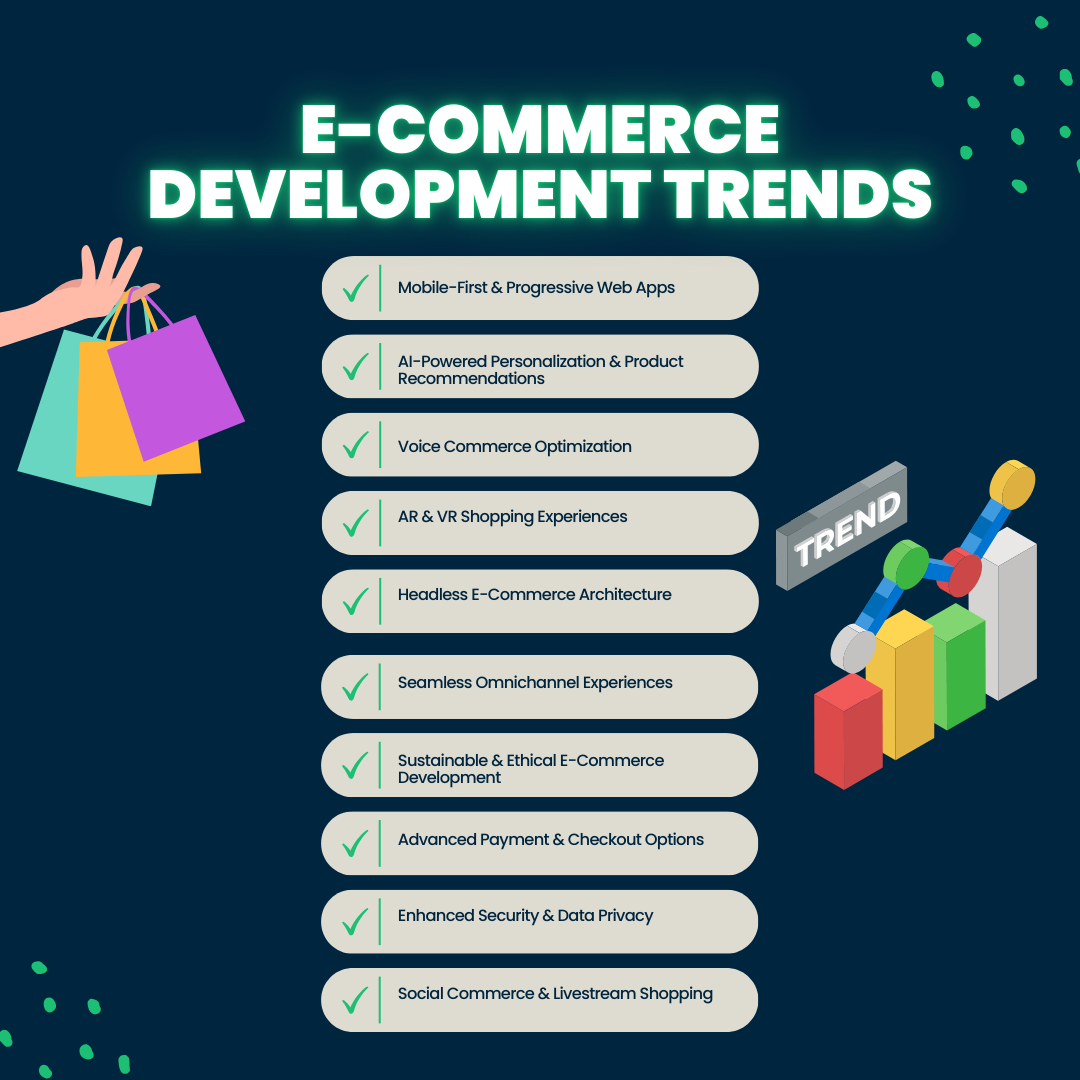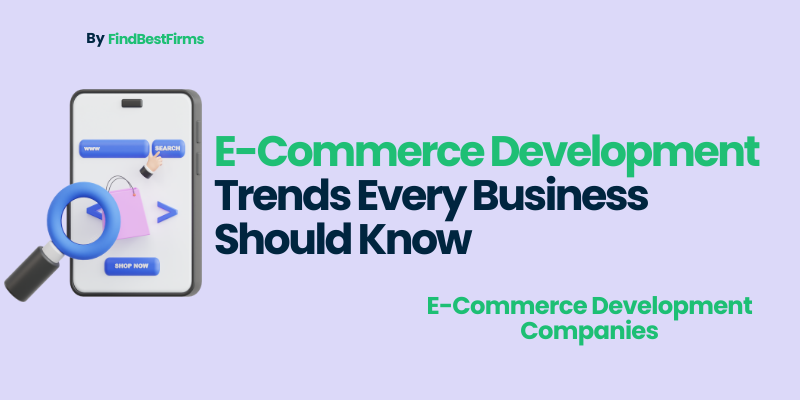The online market is fast changing more than ever. A strategy that was effective in an online business several years ago might be too old fashioned or even useless nowadays. Consumers are more knowledgeable, more demanding and desire a unified, personalized experience across devices and platforms. The latter is the reason why keeping up with the trends of e-commerce development is not an option for survival and growth in the competitive market.
As a start up and an entrepreneur, adherence to these trends will eliminate unnecessary expenditure of funds on making wrong decisions and every investment will yield quantifiable returns. The already existing business owners are not left behind because such altering to new technologies and behaviors helps maintain a loyal customer base, and even gain new customers. It is not enough to be aware of these changes, but to be able to tactfully employ them in a way that fits your objectives in business.
E-Commerce Development Trends

Rise of Mobile-First & Progressive Web Apps (PWAs)
Mobile-first is not only a hype, but the fact of the updated shopping. Smartphones and tablets currently account for over 70% of the e-commerce traffic across the globe. Mobile-first design and optimization place your online store in a position where it will be faster, easier to navigate, and touch-friendly because the design was built around smaller screens. When your site fails to work on mobile, there is a chance to lose customers even before they could see your products.
Another giant leap is the Progressive Web Apps (PWAs). Going beyond the traditional savvy of the websites and the mobile apps, PWAs are the means of combining the best of both worlds and providing offline support, push notifications, and super-speed without downloading the app through the app stores. Even such brands as Starbucks and Flipkart have already observed the tremendous increase in engagement by moving to PWAs. The technology is available to businesses of all scales, and hence it is a viable investment in the future.
Collaborating with professional e-commerce development agencies may help you make sure your mobile-first or PWA approach is executed properly. They will be able to create responsive design, resize images to suit specific screen resolutions as well as incorporate advanced mobile functions that will enhance customer retention and conversions.
AI-Powered Personalization & Product Recommendations
The customers of the modern market require the brands to know about their needs sometimes even before they realize it themselves. It can be achieved through AI-powered personalization that involves the analysis of browsing history and purchase history, as well as demographic data to provide pertinent suggestions and offers. Such a degree of personalization speeds up shopping, simplifies the process, and provides pleasure to the buyer.
The advantages of personalization can be measured. It is demonstrated that personalized product suggestions may raise conversion rates by up to 300% and skyrocket average order value. The larger companies such as Amazon and Netflix have raised the bar with the use of sophisticated algorithms to maintain user traffic and now they have become accessible to small-scale companies via new e-commerce systems.
AI personalization can be embedded into the product searches, home page banners and even into the email campaigns when used by the professional e-commerce development specialists. The outcome is a more holistic experience that persuades repeat purchases and life-long brand loyalty.
Voice Commerce Optimization
The emergence of voice assistants, such as Alexa, Google Assistant, and Siri, has transformed the search and purchase behavior of people. It is predicted that voice searches will dominate more than 50 % of internet searches by 2026. Voice commerce enables customers to search, compare prices, and order products by making some basic verbal commands in most cases when they are multitasking.
Voice search optimization is not the same as usual SEO. Rather than being short, voice search is conversational and longer such as what is the best shoe that helps run with flat feet? This implies that the textual contents of your products, and blog should be written in a personal, inquisitive style.
Innovative e-commerce development firms can assist in making voice-friendly search part of your store so that your products can be readily located in a burgeoning voice-based economy. They are also able to streamline checking out processes to ensure that purchasing using voice assistants is as easy as possible where you gain a competitive edge.
AR & VR Shopping Experiences
One of the biggest challenges in online shopping is the inability to try products before buying. Augmented Reality (AR) and Virtual Reality (VR) are solving that problem by allowing customers to interact with products in a more immersive way. From trying on clothes virtually to seeing how a piece of furniture fits in a living room, these technologies reduce uncertainty and boost buyer confidence.
Brands like IKEA and Sephora have already proven the value of AR/VR shopping experiences. IKEA’s AR app, for example, lets customers preview furniture in their home environment before making a purchase, significantly reducing return rates. For businesses, these tools can lead to higher sales and fewer post-purchase disappointments.
Implementing AR/VR isn’t just for big brands anymore. Many e-commerce development agencies now offer scalable solutions that small and medium businesses can afford, helping them stand out in crowded markets with engaging, interactive product displays.
Headless E-Commerce Architecture
Headless commerce is transforming how online stores operate. In this setup, the front-end (what users see) is separate from the back-end (where data and processes live). This separation allows for faster updates, greater customization, and the ability to deliver content to multiple channels at once from websites to apps to in-store screens.
One of the biggest advantages of headless architecture is flexibility. You can experiment with new features and designs without disrupting the core system, making it easier to innovate and respond to market trends. This is especially useful for growing businesses that need to scale quickly.
Partnering with skilled e-commerce development companies ensures a smooth transition to headless systems. They can integrate APIs, manage complex data flows, and ensure your front-end experience remains seamless across all devices and platforms.
Seamless Omnichannel Experiences
Today’s customers don’t shop in a straight line. They might browse your website on mobile, research reviews on desktop, and complete their purchase in-store or the other way around. An omnichannel strategy ensures that no matter where they interact with your brand, the experience is consistent and connected.
Omnichannel e-commerce development focuses on synchronizing inventory, pricing, and promotions across every touchpoint. It also allows for conveniences like “buy online, pick up in store” (BOPIS) or returning online purchases in a physical location. This kind of flexibility builds customer trust and loyalty.
Brands like Apple and Nike have mastered the omnichannel approach, offering seamless transitions between digital and physical shopping experiences. With the right e-commerce development partner, even smaller businesses can implement similar strategies without the heavy investment of enterprise-level systems.
Sustainable & Ethical E-Commerce Development
Sustainability is no longer just a trend, it's an expectation. Consumers are increasingly choosing brands that prioritize eco-friendly practices and ethical sourcing. This shift has made sustainability a key part of e-commerce development strategies.
From offering carbon-neutral shipping options to highlighting products made from recycled materials, businesses can showcase their commitment to the environment directly on their websites. Even small details, like using eco-friendly packaging or displaying certifications, can make a big impact.
Working with e-commerce development experts ensures these values are not only part of your operations but also communicated clearly through your site’s design, product descriptions, and marketing campaigns. This alignment between brand values and customer expectations can be a strong differentiator in competitive markets.
Advanced Payment & Checkout Options
The checkout process is where many potential sales are lost. A slow, complicated, or limited payment system can frustrate customers and cause them to abandon their carts. That’s why advanced payment options are now a top priority in e-commerce development.
One-click checkout, Buy Now Pay Later (BNPL) services, and digital wallets like Apple Pay or Google Pay are becoming standard. Offering multiple payment options increases convenience and gives customers flexibility, especially in international markets where payment preferences vary.
E-commerce development companies can integrate these solutions while ensuring security and compliance with global payment standards. This not only improves conversion rates but also builds trust with your customers.
Enhanced Security & Data Privacy
Cybersecurity threats are rising, and customers are becoming more protective of their personal information. A single breach can damage a brand’s reputation for years, so robust security measures are non-negotiable in e-commerce development.
Implementing SSL encryption, two-factor authentication, and secure payment gateways are just the basics. Compliance with regulations like GDPR and CCPA is essential for businesses that serve international customers.
E-commerce development experts can also set up proactive monitoring systems to detect and prevent suspicious activity before it causes harm. This combination of strong security and transparency builds long-term trust with your audience.
Social Commerce & Livestream Shopping
Social media has evolved from a marketing tool into a powerful sales channel. Platforms like Instagram, TikTok, and Facebook now offer integrated shopping features, allowing customers to browse and buy without leaving the app.
Livestream shopping is another growing trend, where brands host live product demos and allow viewers to purchase in real time. This interactive format builds excitement, creates urgency, and can generate significant sales in a short period.
E-commerce development companies can help integrate these social shopping features into your broader strategy, ensuring that your website, social profiles, and marketing campaigns work together to drive sales.
In Summary
Businesses that are flexible, tech-friendly, and customer-centred have the future of e-commerce. Such trends as mobile-first design, AI personalization, AR/VR, omnichannel integration rapidly turn into an ordinary expectation and no longer into a competitive advantage.
By remaining abreast and putting these strategies into practice early enough you will be able to have your business stand in a highly evolving market. As a startup company that intends to launch or an established brand that is willing to make an innovation, the solution is the correct technology and method.
Collaboration with professional e-commerce development companies will allow you to realize these trends effectively and efficiently. They possess the knowledge to help your store not only keep pace with the existing customer demands, but also be ready to deal with the future. It is time to change and adapt since in e-commerce, the future is rapid.

